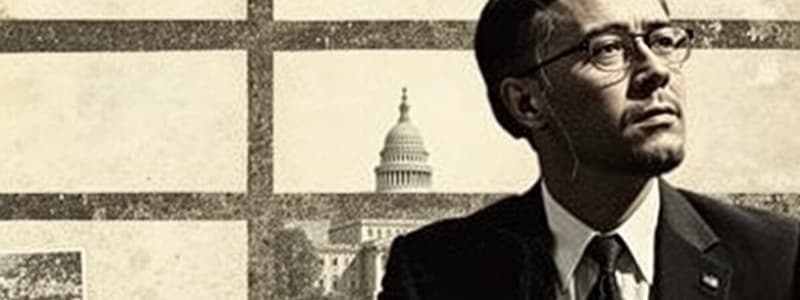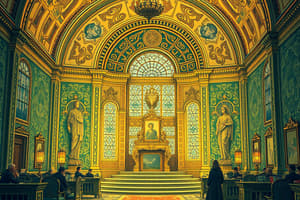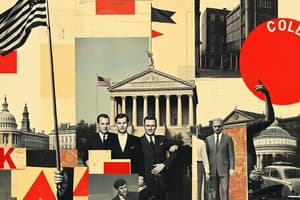Podcast
Questions and Answers
Which principle of bureaucracy ensures that tasks are divided systematically within the organization?
Which principle of bureaucracy ensures that tasks are divided systematically within the organization?
- Fixed and official jurisdictional areas. (correct)
- Temporary commissions without clear boundaries.
- Management through individual privileges and favors.
- The use of personal trustees for important measures.
In a fully developed bureaucratic structure, how are disputes generally resolved?
In a fully developed bureaucratic structure, how are disputes generally resolved?
- Through unregulated means of coercion.
- Through decisions made by personal trustees of the ruler.
- Through appeals to a higher authority in a regulated manner. (correct)
- Through temporary commissions assigned on a case-by-case basis.
What characterizes the management of a modern office in a bureaucracy?
What characterizes the management of a modern office in a bureaucracy?
- Adherence to flexible, case-specific commands.
- Application of general rules that are stable and exhaustive. (correct)
- Reliance on personal relationships and individual discretion.
- Management that varies based on sacred tradition only.
Which of the following is a key aspect of the modern civil service's approach to personal property and official duties?
Which of the following is a key aspect of the modern civil service's approach to personal property and official duties?
In a bureaucracy, what does 'office holding as a vocation' primarily imply for an official?
In a bureaucracy, what does 'office holding as a vocation' primarily imply for an official?
What type of loyalty is characteristic of the modern official to their office?
What type of loyalty is characteristic of the modern official to their office?
Which factor most significantly determines the social position of an official in countries with old civilizations, according to the content?
Which factor most significantly determines the social position of an official in countries with old civilizations, according to the content?
According to the content, why might the social esteem of officials be particularly low in new settlements like those in the United States?
According to the content, why might the social esteem of officials be particularly low in new settlements like those in the United States?
According to the content, what is the primary method by which a pure type of bureaucratic official is appointed?
According to the content, what is the primary method by which a pure type of bureaucratic official is appointed?
What effect does the election of officials typically have on hierarchical subordination within a bureaucracy?
What effect does the election of officials typically have on hierarchical subordination within a bureaucracy?
What is the role of political parties in an election where there is a formally free election?
What is the role of political parties in an election where there is a formally free election?
What is one way that elected mayors have reformed administrations?
What is one way that elected mayors have reformed administrations?
How does the principle of tenure for life affect the independence of officials, particularly in comparison to workers in private enterprises?
How does the principle of tenure for life affect the independence of officials, particularly in comparison to workers in private enterprises?
What primarily determines an official's salary in a bureaucracy?
What primarily determines an official's salary in a bureaucracy?
Which of the following situations would most likely result in relatively lower salaries for officials?
Which of the following situations would most likely result in relatively lower salaries for officials?
What does the content suggest is a common desire of the average official regarding their conditions of promotion?
What does the content suggest is a common desire of the average official regarding their conditions of promotion?
According to the content, what can a strong development of "the right to the office" lead to?
According to the content, what can a strong development of "the right to the office" lead to?
What is the status of lifetime employment for bureaucracies?
What is the status of lifetime employment for bureaucracies?
Why can officials depend on equals rather than superiors?
Why can officials depend on equals rather than superiors?
Flashcards
Bureaucracy: Jurisdictional Areas
Bureaucracy: Jurisdictional Areas
Fixed jurisdictional areas, ordered by rules, laws, or regulations
Bureaucracy: Official Duties
Bureaucracy: Official Duties
Regular activities are distributed as fixed official duties.
Bureaucracy: Stable Authority
Bureaucracy: Stable Authority
Authority to give commands is stable and delimited by rules.
Bureaucracy: Methodical Provision
Bureaucracy: Methodical Provision
Signup and view all the flashcards
Bureaucracy: Office Hierarchy
Bureaucracy: Office Hierarchy
Signup and view all the flashcards
Office holding: a duty
Office holding: a duty
Signup and view all the flashcards
The Official: Social Position
The Official: Social Position
Signup and view all the flashcards
Official positions: Terms
Official positions: Terms
Signup and view all the flashcards
Compensations: Fixed Salary
Compensations: Fixed Salary
Signup and view all the flashcards
The Official: Career Progression
The Official: Career Progression
Signup and view all the flashcards
Study Notes
Characteristics of Bureaucracy
- Modern officialdom operates with fixed jurisdictional areas, typically ordered by rules, laws, or administrative regulations.
- Regular activities are assigned as official duties within the governed structure.
- Authority to command is stably distributed and delimited by coercive rules.
- Methodical provisions ensure continuous duty fulfillment, employing qualified personnel.
- Public and lawful governments use these three elements to create "bureaucratic authority".
- Private economic domination relies on the same factors for bureaucratic "management".
- Bureaucracy is fully developed in political and ecclesiastical communities in the modern state and advanced capitalist institutions.
- Permanent public office authority with jurisdiction is the exception rather than the rule, historically.
- Rulers often used personal trustees or court servants for important measures instead of established offices.
- Commissions and authority were not precisely defined but were temporarily assigned.
Principles of Office Hierarchy and Authority
- A firmly ordered system exists with supervision of lower offices by higher ones.
- Governed individuals can appeal decisions to higher authorities in a regulated manner.
- The office hierarchy is monocratically organized when bureaucracy is fully developed.
- Hierarchical office authority exists in state, ecclesiastical structures, party organizations, and private enterprises.
- Bureaucratic character is not changed based on if the authority is "private" or "public".
- Hierarchical subordination doesn't authorize higher authorities to take over lower office business when jurisdictional competency is fully implemented.
- Offices tend to continue and be held by others after fulfilling their initial tasks.
Modern Office Management
- Based on written documents ("the files") preserved in their original or draft form.
- Involves staff or subaltern officials and scribes, while the body of officials in a "public" office, along with materials and files, makes up a "bureau".
- Private enterprises usually call the "bureau" as the "office".
- Civil service separates the bureau from the official's private residence and segregates official activity from private life.
- Public funds and equipment are separate from an official's private property.
- Executive office is separate from the household, business from private correspondence, and business assets from private fortunes.
- Modern entrepreneurs act as the "first official" of their enterprise.
- The concept of the state's bureau activities differing from private economic offices is a continental European idea, foreign to the American system.
- Specialized office management requires thorough and expert training.
- This applies to private enterprise executives and employees and state officials.
- Fully developed offices demand the official's full working capacity, potentially with firmly delimited obligatory time.
- Management follows general, stable, and exhaustive rules that can be learned.
Office Management Rules
- Knowledge represents technical learning involving jurisprudence, administrative or business management.
- Reduction of modern office management to rules is rooted in its nature.
- Public administration theory assumes authority to order by decree doesn't entitle the bureau to regulate matters by commands for each case, but to regulate it abstractly.
- This contrasts regulating relationships through individual privileges, which dominates in patrimonialism unless fixed by sacred tradition.
Position of the Official
- Office holding is a "vocation" demanding training and examinations
- The official position is a duty, legally and actually.
- Office holding shouldn't be exploited for rents or usual service exchanges.
- Entering an office means accepting faithful management duties for a secure existence.
- Modern loyalty to an office doesn't relate to a person but impersonal purposes, and replaces earthly masters with ideas like "state," "church," "community," "party," or "enterprise".
- Political officials are not the personal servants of a ruler.
Personal Position of the Official
- Strives for and often enjoys social esteem.
- Social position is guaranteed by rank rules and, for political officials, criminal code definitions protect against insults and contempt.
- Social position is highest with trained experts, social differentiation, or costly training.
- Educational certificates enhance social position.
- Status is explicitly recognized, requiring consent from the official body for aspirants.
Appointment of Officials
- Pure type of bureaucratic official is appointed by a superior authority.
- Formal elections don't always exclude appointments, especially by party chiefs.
- Firmly organized parties can turn free elections into acclamations of the party chief's candidate.
- Formally free elections become regulated fights for votes.
- Elections modify hierarchical subordination, giving elected officials autonomy.
- Elected officials don't derive positions "from above," but from powerful party members who control their careers.
- Appointed officials function more technically and functionally.
- Governing people can assess expertise only through experience.
- Parties prioritize services to the party boss over expertise.
- Conditions are similar where monarchs appoint, but followings are less controllable.
- Trained professionals' demand and public opinion's recognition render unqualified officials harmful to the ruling party.
- Elected administrative chiefs and officials may compromise expert qualifications of a bureaucratic mechanism.
- It also weakens officials' dependence upon the hierarchy which is harder to oversee in large administrative structures.
The Official's Tenure and Compensation
- Normally held for life, legally guaranteed against arbitrary dismissal.
- Legal guarantees ensure objective duty discharge, free from personal considerations.
- Officials seek civil-service laws for old age security and removal protection, but "right to the office" can hinder technical efficiency and career opportunities.
- Compensation includes a fixed salary and pension based on status and seniority.
- Income security and social esteem make offices sought-after, allowing low salaries in some nations.
Official Career Advancement
- The official is set for a "career" inside the hierarchical structure and desires fixed promotion conditions based on seniority or examination grades.
- Examinations establish the official's character and have lasting effects.
- Offices can be viewed as "prebends" for those with educational certificates.
- General qualifications consider the higher political offices, especially positions of "ministers," and are filled without educational certificates.
Studying That Suits You
Use AI to generate personalized quizzes and flashcards to suit your learning preferences.




